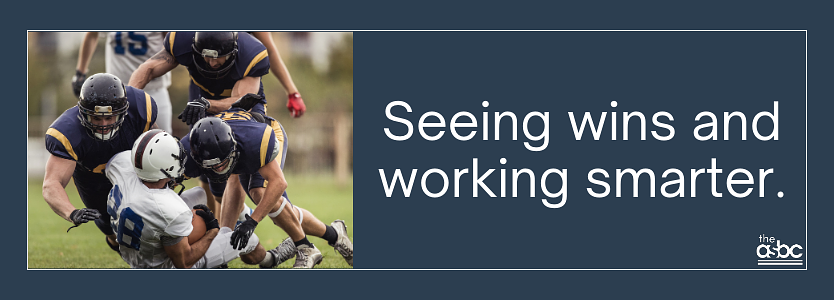Seeing wins and working smarter.

Learning to break boards in karate was about striking at the right speed at the right point. As a defensive player in football, it was about taking the most direct angle of attack to stop the ball carrier. Striving to execute precise and efficient actions was drilled in to me by sensei’s and coaches over the years, and seeing myself do it successfully before actually doing it, was part of the preparation. I applied seeing wins and working smarter throughout my years selling to the Government, and I use it today to help The ASBC and our members succeed.
In federal contracting, I see many people working hard, but not always working smart. Some of them are getting the results they want, but too many of them are not. What’s interesting is they all seem to be following the course of action prescribed by the “experts.” Maybe that’s the problem. When we’re in session at Ethical Stalking for Government Contractors® Bootcamp, or presenting content at Government and Industry conferences, we hear a lot about the guidance received from “expert” sources. Ultimately, it sounds a lot like telemarketer scripts of the long distance phone companies from the 1980s. Fast-talk and/or big words that sound impressive to the less informed and uninformed, with little usable substance for those receiving the information. Too often, the strategies being dispensed represent a quantity over quality approach that most often returns lackluster results, sometimes worse.
When I say quantity over quality, I’m not kidding. “Go to more events! Bid on more RFPs! Respond to more RFIs! Add more small business certifications!” All are ill-informed elements of prevailing strategies being shared where the winning isn’t proportional to the emotion, money, and time being invested.
I am not, and never have been, afraid of putting in the work. “Hard work pays off” is a phrase said by most, if not all of the sports coaches I’ve had since playing on my first team in elementary school. I don’t think I truly understood or appreciated it until middle school lacrosse which is when I remember being able to understand the difference between the feeling of winning versus losing. Making no apologies, I definitely liked the winning feeling much more. Thanks to my coaches Page, Day, Kelly, Qatsha, Fisher, Reilly, and others, I learned how to be a good sport and a gracious loser. I also learned that being gracious in losing doesn’t mean I have to like losing.
Let me rephrase my last sentiment. I don’t like losing. Very much like Captain James T. Kirk beating the Starfleet Academy no-win training exercise known as the Kobayashi Maru, I go into every competitive situation assuming the win by having the best possible plan to ensure it happens. As far as I was concerned first as an athlete, later as a federal contractor, and today as an advisor and coach, the opposing force is a formality that hasn’t yet realized their role in MY world.
When I started my journey in federal contracting, my desire to win that was forged on the pitches, diamonds, courts (tennis), fields, pools, and mats, was very much intact. Even before I took on my first sales role, winning took the form of finding ways to create victories that benefited my employers. Getting reduced rates on freight when I worked in the warehouse, or finding product rebates when I supported the operations team, were small things I could do to help the bottom line. In sales, I was focused on providing the right products and services to support my customers, and getting to a win for them, and for me. I was pretty good at it, too. I pursued small deals and big deals equally because they contributed to meeting and exceeding my quota. Right around my 8th year in federal contracting, also known as my second year in federal sales, I got into a healthy rhythm. I had BPAs with most of the Navy Fleet Industrial Supply Centers (FISC), which led to my having to refill the paper on my fax machine, frequently. I became very proficient at leveraging the new Simplified Acquisitions purchasing methods, to sniff out new and bigger opportunities. These streamlined purchases kept the lights on, and provided me opportunities to go whale hunting for single and multiple-award wins on contracts like the Navy’s F/A-18 Electronic Classroom, MAMC Project Seahawk, and contract vehicles like GSA Connections/USARC Telecommunications Management, Navy IT-21, NIH ECS 2, and more. The trick for me was not wasting time. Most events I attended were aligned to my customers. Rarely did I attend events for the sake of being at an event, or for the primary purpose of networking. I was there to collect wins.
In federal contracting, there is an endless flow of busy work that feels productive, yet moves you away from rather than towards your goals. Be thoughtful to yourself and be stingy with your time by being selective and smart about your activities. Envision yourself achieving your desired results in order to make them your reality.
Hard work will pay off, and doing it smartly helps ensure it does.
Peace, Health, and Thriving,
Go-To-Guy Timberlake